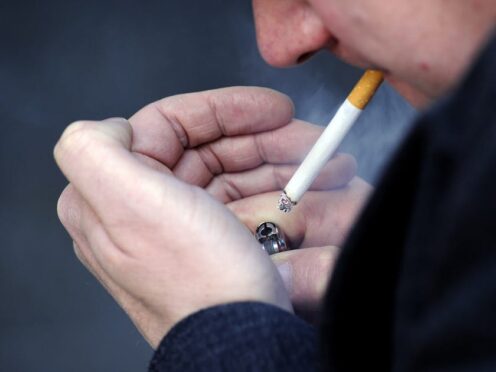Cancers caused by smoking have reached an all-time high of 160 new cases per day, a charity has warned.
Analysis by Cancer Research UK shows smoking has driven a 17% rise in cancer cases since 2003 in the UK, with the biggest jumps in liver, throat and kidney cancers, which have doubled over the last 20 years.
In 2003, there were 49,325 cancer cases of all types caused by smoking, rising to 56,091 in 2013 and 57,555 last year.
For liver cancer alone, smoking-linked cases have risen from 711 in 2003 to 1,630 last year, while kidney cancer has gone from 1,215 in 2003 to 2,151 last year.
Throat cancer cases have risen from 619 to 1,261 over the same period.
Although smoking rates in the UK are going down, a growing population means there are still about 6.4 million smokers in the UK.
The new round-up also includes cases of breast cancer after Cancer Research UK said it was confident in the scientific research showing the effects of smoking on risk for that disease.
The analysis said smoking is linked to about 2,200 cases of breast cancer every year in the UK.
Tobacco is known to cause 16 different types of cancer, with lung cancer alone causing 33,000 cases annually.
Cancer Research UK is calling on the Government to re-introduce the Tobacco and Vapes Bill to the first King’s Speech later this month.
The Bill, which would have made it illegal to sell tobacco products to anyone born after January 2009, was shelved after the General Election was called.
Dr Ian Walker, Cancer Research UK’s executive director of policy, said: “Right now, six people are diagnosed every hour in the UK with cancer that was caused by smoking.
“Every hour, six families’ lives are changed forever by an illness that could have been prevented.
“Smoking is a uniquely toxic consumer product and has no place in our future.
“Raising the age of sale of tobacco products will be one of the biggest public health interventions in living memory, establishing the UK as a world leader.
“It’s vital that this Bill is re-introduced at the King’s Speech, passed and implemented in full so the impact of smoking is consigned to the history books.”
Health Secretary, Wes Streeting, said: “As a cancer survivor, it is a personal priority that we reduce the numbers of people falling ill with the disease.
“Prevention is better than cure. This Government will shift the focus of healthcare from simply treating sickness to preventing it in the first place.
“We are committed to creating a smoke-free country, so the next generation can never legally be sold cigarettes.
“Protecting future generations from the harms of smoking will save thousands of lives and ease pressures on the NHS. By building a healthier society, we will help to build a healthy economy.”
It comes as nine cancer cancer specialists writing in the Lancet Oncology said the NHS is at a tipping point in cancer care.
They argued there is a long way to go before the NHS has enough staff and that “novel solutions”, such as new diagnostic tests, have been wrongly hyped as fixes for the cancer crisis but “none address the fundamental issues of cancer as a systems problem”.
The experts said there are “shortages in every aspect of the UK cancer workforce” and call for system-wide reform to cut cancer care inequality and drive up earlier diagnosis and timely treatment.
One of the authors, Professor Pat Price, co-founder of the catch-up with cancer campaign and chair of Radiotherapy UK, said: “Cancer services are in crisis. The tragedy is that it doesn’t have to be this way.
“The cancer community knows what needs to be done and how to do it. Too often, policymakers focus on one aspect, like diagnosis, but that alone isn’t enough.
“If you boost diagnosis but don’t treat people on time, the newly diagnosed patients just end up stuck on long waiting lists. We need quick diagnosis and timely treatment.”
She added: “Cancer is a complex disease. But the starting point to tackling our poor survival outcomes is simple: get a plan.
“Reverse the decision made by the last Government to scrap the national cancer control plan. All the international evidence shows that countries with national cancer plans have better survival.
“And make sure the plan is properly resourced and ensures we treat on time as well as diagnose early.”
